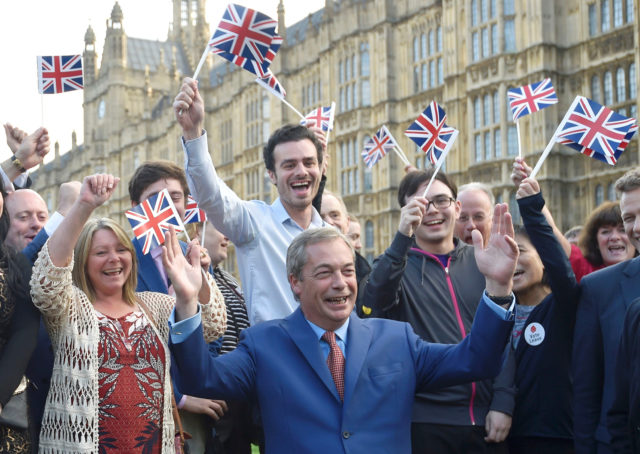Uncertainty.
That is what we are left with following Britain’s vote Thursday to leave the European Union.

Nigel Farage, the leader of the United Kingdom Independence Party (UKIP), makes a statement after Britain voted to leave the European Union in London, Britain, June 24, 2016. (Reuters)
Financial markets hate uncertainty. So, the precipitous drop in stock markets worldwide should not come as a surprise. Yet it is staggering to see the vote’s outcome resulting in two trillion dollars of lost equity. So far.
Britain voted for the uncertainty of change. The status quo was not working for them. Similar political sentiments are echoed in the United States, personified by the success, so far, of Donald Trump’s presidential campaign.
The change Britain voted for will likely bring on other change. Expect Scotland and Northern Ireland to look for ways to stay in the E.U., which may mean leaving the United Kingdom.
Richard Haass, president of the Council on Foreign Relations, questions whether voters understood the consequences. That sentiment seems to be borne out in the British blogosphere, where Google Trends says there was a 250-percent spike in searches for “What happens if we leave the EU?”
Result: uncertain.
As Britain Decided its Future, Striking Parallels with U.S. Political Debates Emerged
Dan Balz – The Washington Post
Republican presidential candidate Donald Trump speaks during a news conference at Turnberry Golf course in Turnberry, Scotland, June 24, 2016. (Reuters)
It may be pure coincidence that Donald Trump flew to Scotland on the day that British voters decided to leave the European Union. But in striking ways, the forces fueling Thursday’s historic referendum here were similar to those that have shaken U.S. politics to its core in the past year.
Trump’s slogan, “Make America Great Again,” could easily have been adapted to the messaging of those in the “leave” campaign across the pond.
Just arrived in Scotland. Place is going wild over the vote. They took their country back, just like we will take America back. No games!
— Donald J. Trump (@realDonaldTrump) June 24, 2016
Brexit Vote Has Huge Ramifications for U.S. Politics
Roger L. Simon – PJ Media
Earth to elites: Citizens of truly democratic countries don’t want unlimited immigration into their countries by people who couldn’t be less interested in democracy. They also don’t want to be governed by the rules and regulations of faceless bureaucrats whose not-so-hidden goals are power and riches for themselves and their friends. Simple, isn’t it?
Why Brexit Should Scare Anti-Trump Americans
Peter Weber – The Week
The first lesson Brexit has for anti-Trump America is that there’s a potential majority out there that is angry, scared, and more than willing to jump into the abyss. Sober analysts and economists warned Britons repeatedly that pulling out of the EU would be an economic and security debacle. “They heard the warnings, listened to experts of every kind tell them that Brexit meant disaster, watched the prime minister as he urged them not to take a terrible risk,” says Matthew d’Ancona at The Guardian. “And their answer was: Get stuffed.”

People gathered in The Churchill Tavern, a British themed bar, react as the BBC predicts Briatin will leave the European Union, in the Manhattan borough of New York, U.S., June 23, 2016. (Reuters)
The second big lesson Brexit has for Trump opponents is that nativism, anti-immigration fervor, and elite-bashing are potent tools, not to be underestimated. There was a definite flavor of “Make Britain Great Again” running through the Leave campaign, with Brexit proponents arguing that British sovereignty was being undermined by unelected elites in Brussels. One reason the referendum passed is the unexpectedly strong support of working-class Labour voters in northern England, the rough equivalent of midwestern Reagan Democrats, who don’t believe they have benefitted from open markets and open borders.
No, Donald Trump Does Not Explain Brexit
Joseph J. Schatz – Politico
[R]hetorical similarities to “Make America Great Again” aside, Boris Johnson is not Donald Trump. And for all the common misgivings about globalization in both countries, and the parallels being made between Great Britain’s nativist-tinged debate over leaving the EU and the rise of conservative populism in the United States, a vote for “Brexit” doesn’t exactly equal a vote for Trump.
In the end, all politics is still local.
In fact, the United Kingdom has been fighting this raucous, existential battle for more than forty years now. There was a referendum on staying in the EU in 1975, after all, just two years after Britain joined the European Economic Community—the precursor of the EU—in the first place.
Britain’s Bold Leap Into the Unknown
Robert Kahn – Council on Foreign Relations
The fallout from the Brexit vote in the United States–tighter financial conditions caused by weaker stock markets and reduced risk taking, uncertainty about the future of Europe and global trade, as well as a weaker outlook for growth, strengthens the case for the Fed to put off rate hikes (if they needed any reason beforehand). Many issues that have come to the fore in our election campaign, including anxiety about the economic future of the country and globalization, will get a new look today. Together, there are many reasons to believe the economic consequences for the United States could be significant. Again, Britain punches above its weight.


